
Spine Health in Childhood: Encouraging Good Habits
August 2, 2023
Aging and Spine Health: Coping with Degenerative Changes
October 3, 2023Pregnancy and Spine Health: Coping with Back Pain

Pregnancy and Spine Health Coping with Back Pain
Pregnancy and Spine Health: Coping with Back Pain. Pregnancy is a transformative journey that brings about numerous physical changes, including those impacting spine health.
Understanding the intricate relationship between pregnancy and the spine is essential for expectant mothers seeking to manage and alleviate back pain.
This article delves into the causes of back pain during pregnancy and explores effective coping strategies that promote spine health and overall well-being.
Table of Contents
Understanding the Relationship Between Pregnancy and Spine Health
The human body undergoes remarkable changes during pregnancy, some of which can affect the spine.
As the body adapts to accommodate the growing fetus, shifts in posture, hormonal fluctuations, and changes in weight distribution can lead to back pain and discomfort.
Coping With Back Pain During Pregnancy
Pregnancy-related back pain can be attributed to a combination of factors.
By understanding these causes and implementing appropriate coping strategies, expectant mothers can proactively manage and alleviate back pain, enhancing their overall pregnancy experience.
Pregnancy-Related Changes to the Spine
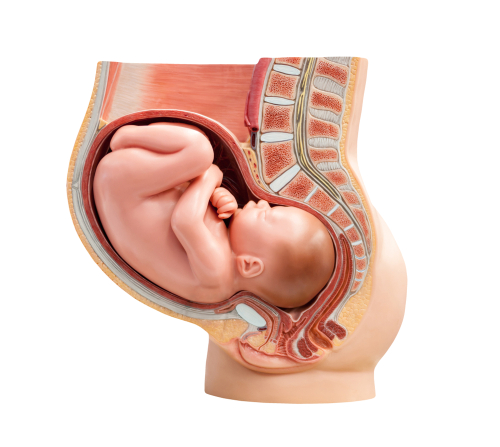
Postural Changes
Pregnancy often leads to posture and spinal alignment shifts as the body adjusts to accommodate the growing fetus.
Practicing good posture and engaging in gentle exercises that promote spinal alignment can help alleviate back pain caused by postural changes.
Hormonal Changes
Hormonal fluctuations play a role in pregnancy-related back pain, particularly due to the effects on ligaments and joints.
Hormones like relaxin cause ligaments to become more flexible, which can lead to instability in the joints.
This instability may contribute to discomfort and pain in the back.
Supportive measures such as wearing appropriate footwear and avoiding activities that strain the spine can help manage joint instability and minimize discomfort.
Common Causes of Back Pain During Pregnancy
Increased Weight and Pressure
As the body gains weight to support the growing fetus, additional pressure is placed on the spine.
Exercising that strengthens core muscles can provide better support for the spine as the body carries the extra weight.
Practicing proper body mechanics, such as bending at the knees when lifting objects, can help reduce pressure on the spine.
Utilizing supportive pillows for sitting and sleeping can also alleviate strain.
Center of Gravity Shift
During pregnancy, the body’s center of gravity shifts, affecting balance and posture.
Adopting stable and balanced movements, such as widening the stance while walking, can help accommodate the body’s shifting center of gravity.
Participating in activities like prenatal yoga that focus on balance and stability can help prevent falls and minimize strain on the spine.
Effects of Back Pain on Pregnancy
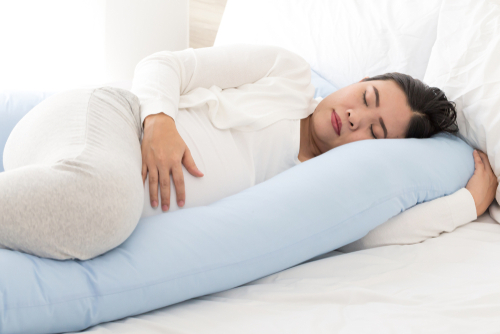
Discomfort and Reduced Quality of Life
Chronic back pain can significantly impact an expectant mother’s overall quality of life and well-being.
Acknowledging the effects of back pain and seeking appropriate interventions is crucial for maintaining a comfortable pregnancy journey.
Using pillows to support different parts of the body during sleep and engaging in relaxation techniques can enhance comfort and alleviate back pain.
Sleep Disturbances
Back pain can disrupt sleep, leading to fatigue and decreased energy levels.
Experimenting with different sleep positions and using pillows to provide additional support can help manage sleep disturbances.
Sleeping on the side with knees bent and a pillow between the legs can help maintain spinal alignment and reduce strain on the back.
Lifestyle Modifications for Spine Health
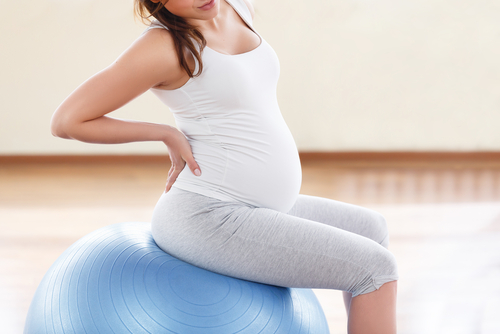
Exercise and Stretching
Engaging in safe exercises that promote spinal strength, such as swimming and prenatal yoga, can help alleviate back pain.
Gentle stretching exercises, under the guidance of a healthcare provider, can help improve flexibility and provide relief from discomfort.
Proper Body Mechanics
Practicing proper body mechanics, such as avoiding heavy lifting and using the legs instead of the back, can prevent strain on the spine.
Bending at the knees, keeping the back straight, and maintaining proper posture while sitting can help minimize strain on the spine.
Ergonomics and Posture
Supporting the spine while seated is crucial for preventing back pain.
Using ergonomic chairs and cushions that provide lumbar support can help maintain proper posture and reduce the risk of back pain.
Practicing good posture while performing sedentary tasks, such as using a computer or reading, can prevent back pain.
Rest and Sleep Positioning
Optimizing sleep positions is essential for minimizing strain on the spine during rest.
Placing pillows under the abdomen and between the legs while sleeping can provide additional support and enhance spinal comfort.
Coping with Back Pain
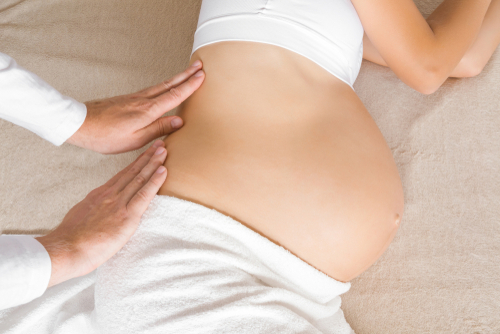
Hot and Cold Therapies
Applying heat and cold therapies can provide temporary relief from back pain.
Applying a warm compress or ice pack to the affected area can help reduce inflammation and alleviate discomfort.
Cold therapy is generally effective during the acute phase of pain, while heat therapy benefits muscle relaxation.
Prenatal Massage
Prenatal massage offers relaxation and relief from pregnancy-related discomfort.
Massage therapy can promote circulation, reduce muscle tension, and enhance overall well-being during pregnancy.
Selecting a certified prenatal massage therapist ensures that expectant mothers receive safe and appropriate care.
Medical Interventions
Pain Relief Medications
Consulting healthcare professionals for guidance on safe pain relief medications is important. Some pain relief medications, such as acetaminophen, may be recommended by healthcare providers for temporary pain relief.
Physical Therapy
Physical therapy plays a valuable role in alleviating back pain during pregnancy.
Physical therapists can design tailored exercise programs that strengthen the muscles supporting the spine.
Safe and effective exercises, such as pelvic tilts and gentle stretches, can help alleviate back pain and promote spinal health.
Supportive Accessories
Supportive accessories like maternity belts and orthopedic pillows can relieve back pain.
Maternity belts offer abdominal and spinal support, relieving pressure and discomfort. Maternity belts lift the abdomen and help distribute weight evenly, reducing strain on the spine.
Orthopedic pillows for pregnant women can improve spinal alignment and alleviate back pain.
Placing orthopedic pillows under the back and between the knees while sleeping can provide targeted support.
Preparing for Labor and Delivery
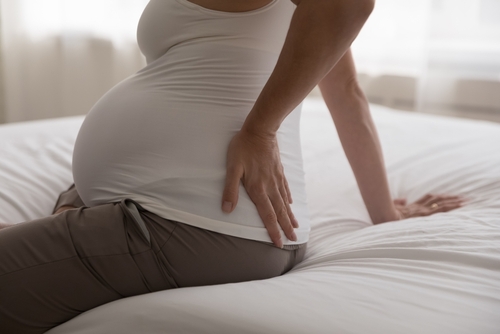
Prenatal Education and Training
Learning techniques for labor and delivery support can enhance comfort during childbirth. Prenatal education classes teach breathing, relaxation, and pain management techniques for labor.
Strengthening Muscles for the Demands of Childbirth
Engaging in exercises that strengthen the pelvic floor and core muscles can prepare expectant mothers for the physical demands of labor.
Breathing and Relaxation Techniques
Practicing controlled breathing and relaxation techniques can help manage pain and reduce tension during labor.
Communicating with Healthcare Professionals
Discussing back pain with obstetricians and midwives during regular prenatal check-ups is important.
Open communication allows healthcare providers to monitor spine health and recommend appropriate interventions.
Throughout pregnancy, monitoring spine health and seeking timely advice from healthcare professionals can ensure optimal well-being.
Collaborative Care Approach
A collaborative approach involving obstetricians, physical therapists, and other specialists can provide comprehensive care for back pain during pregnancy.
By coordinating efforts among healthcare professionals, expectant mothers can access a range of treatments that address the physical and emotional aspects of back pain.
Pregnancy and Spine Health: Coping with Back Pain – Conclusion
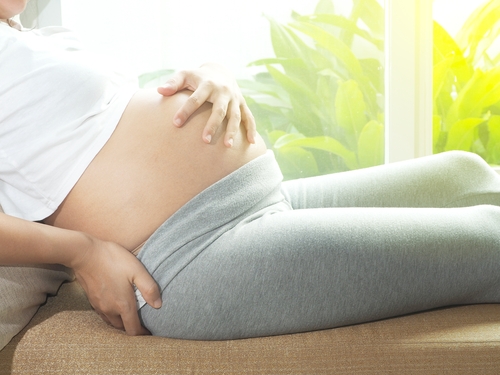
Pregnancy is a journey filled with changes, challenges, and new experiences.
By understanding the relationship between pregnancy and spine health and implementing effective coping strategies, expectant mothers can proactively manage back pain, enhance spinal well-being, and enjoy a more comfortable pregnancy journey.
Through proper body mechanics, exercise, supportive accessories, and communication with healthcare professionals, pregnant women can empower themselves to cope with back pain and embrace the transformative experience of pregnancy with confidence and comfort.
Are you seeking a professional and reliable spine doctor in Singapore? Contact us today!




